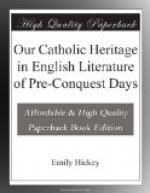When Caedmon awoke the gift remained with him, and he went on composing more poetry. He told the town-reeve about the gift he had received, and the town-reeve took him to the Abbess and showed her all the matter. Abbess Hild called together all the most learned men and the students, and by her desire the dream was told to them, and the songs sung to them that they might all judge what this might be and whence the gift had come. And they were all sure that a divine gift had been bestowed on Caedmon by God Himself. They gave him a holy story and words of divine lore, and bad him sing them if he could, putting them into the measure of verse. In the morning he came back, having set them in most beautiful poetry. And after that the Abbess had him instructed, and he left the life in the world for the religious life. We are told by St Bede that he made much beautiful verse, being taught much holy lore and making songs so winsome to hear that his teachers themselves learned at his mouth.
“He sang of the creation of earth and the making of man, and the history of Genesis, and the going out of the Israelites from the land of the Egyptians, and their entering into the Land of Promise, and many other stories told in the Books of the Canon. He also sang concerning the Humanity of Christ and about His Passion and His Ascension, and about the coming of the Holy Ghost, and the teaching of the Apostles. And he sang also of the Judgement to come and of the sweetness of the Kingdom of Heaven. About these things he made many songs, as well as about the Divine goodness and judgment. And this poet always had before him the desire to draw men away from the love of sin and of evil doing, and to make them earnestly desire to do good deeds.”
At last a fair end was set upon his life when, glad of heart, full of love to those around him, he received Holy Viaticum, and prayed and signed himself with the Holy Sign, and entered sweetly into his rest.
This is the story told for the most part, as it is best to tell it in the way in which St Bede recorded it; and Alfred rendered it into the English of his day, from which English I have now taken it.
CHAPTER II
Caedmon and his influence. Poem, “Genesis.” “The Fall of The Angels.” “Exodus,” English a war-loving race. Destruction of the Egyptians, Fate and the Lord of Fate.
We possess poems on the subjects which St Bede tells us that Caedmon wrote upon, but we cannot be sure that any of these are actually that poet’s work. St Bede tells us that many others after him wrote noble songs, but he sets Caedmon’s work above that of all those others as having been the product of a gift direct from God. In any case he must have influenced those who wrote later than he. All our work whether we are poets, thinkers, fighters, craftsmen, servants, tradesfolk, teachers, must be only partly in what we do directly. This can to




